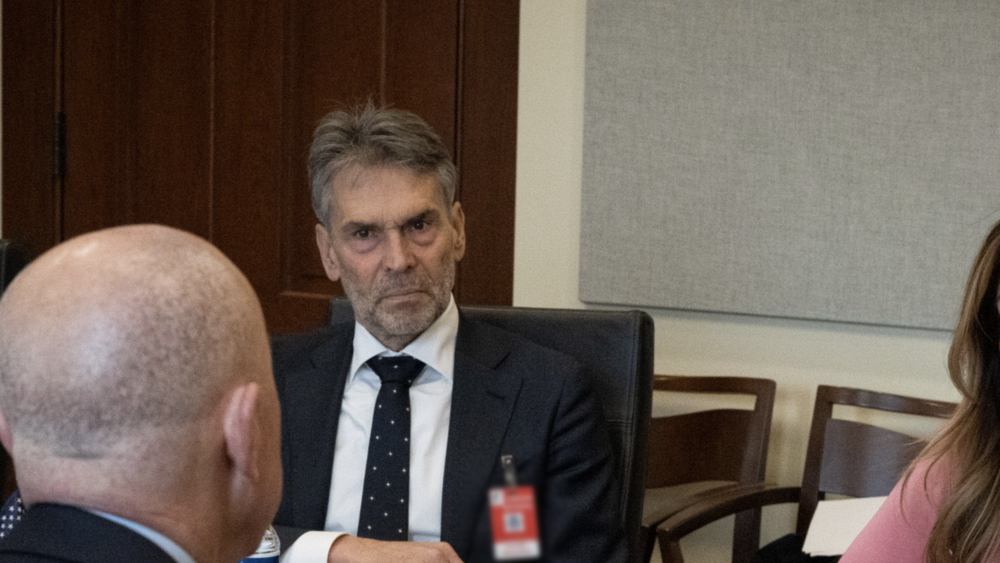
Dutch prime minister-designate Dick Schoof
DHSgov, Public domain, via Wikimedia Commons
On Tuesday evening, Party for Freedom (PVV) leader Geert Wilders and his coalition partners finally announced the name of the Netherlands’ new prime minister: current top official at the Ministry of Justice and Security Dick Schoof.
The 67-year-old Schoof has previously led the Dutch intelligence service, the National Coordinator for Counterterrorism and Security (NCTV), and was director of the Immigration and Naturalization Service.
On X, Wilders congratulated Schoof, listing his reasons for picking him to head the new cabinet.
“Dick Schoof has a great track record, is non-partisan, and therefore is above party politics, has integrity and is also very sympathetic!”
Gefeliciteerd Dick! 👍
— Geert Wilders (@geertwilderspvv) May 28, 2024
Dick Schoof heeft een grote staat van dienst, is partijloos en staat dus boven de partijen, is integer en bijzonder sympathiek bovendien! pic.twitter.com/z5DwsrEEfd
However, the choice has raised serious concerns among the Dutch Right. Some prominent political and thought leaders view him with suspicion, given his previous role in intelligence and his previous membership of the Dutch Labour Party.
Thierry Baudet, leader of the anti-globalist Forum for Democracy (FvD), accused Schoof of being responsible for the “ever greater curtailment of civil liberties.” He cited Schoof’s efforts to increase Dutch intelligence’s surveillance powers, his reports on “anti-institutional extremism” (mostly targeting voices on the Right), as well as “unlawful spying”—a reference to the 2021 Dutch daily NRC’s investigation which revealed that the National Coordinator for Security and Counterterrorism, then led by Schoof, was illegally using fake accounts to secretly monitor citizens on social media.
Dick Schoof is overduidelijk een linkse mainstream guy. Is meer dan 30 jaar lid van de PvdA geweest, en niet zoals Plasterk vrijgevochten en “wakker” geworden, maar z’n hele leven ambtenaar geweest, pro-EU, pro-klimaatbeleid, pro-NAVO en pro oorlog in Oekraïne.
— Thierry Baudet (@thierrybaudet) May 28, 2024
Als AIVD/NCTV…
Baudet added that during last November’s elections, the self-described anti-establishment Party for Freedom had won 37 seats, but that in spite of this, the Dutch would now get “the embodiment of the establishment,” asking whether Wilders had been “controlled opposition all along.”
On X, where she has almost 900,000 followers, right-wing Dutch commentator Eva Vlaardingerbroek described Schoof as the “personification of a technocratic bureaucrat and—being a former member of the Dutch Labour party—the exact opposite of what the Dutch population has voted for during the elections last November.”
“Geert Wilders should have never given up his rightful claim to Prime Ministership,” she added.
BREAKING | The new Dutch cabinet just nominated top justice ministry official and former intelligence chief Dick Schoof as the “preferred candidate” for Prime Ministership. And the situation is bad. Real bad. 👇🏻
— Eva Vlaardingerbroek (@EvaVlaar) May 28, 2024
Dick Schoof – or “Mr. Deepstate” as I’d like to call him – is the… pic.twitter.com/jNf4HseMYL
During a press conference held later that day, Schoof mostly spoke in positive terms, saying he wanted to be prime minister “to all Dutch people,” and intended to take their concerns seriously.
He added that he would implement the plans agreed on by the incoming conservative coalition government.“My plans for the Netherlands are what the group leaders have agreed,” he said.
In the following weeks, formateur Richard van Zwol, who is tasked with helping form the new government, will work with Schoof (while getting input from the four parties) to put together a cabinet team. Afterwards, that cabinet will start work on formulating policy.
Van Zwol has expressed his hope that the new cabinet would be formed by June 26th, just before the summer recess in early July.
